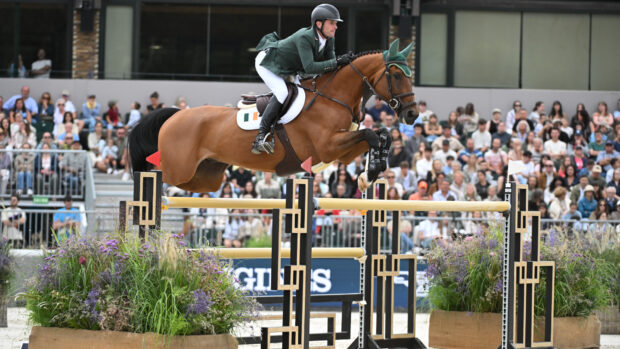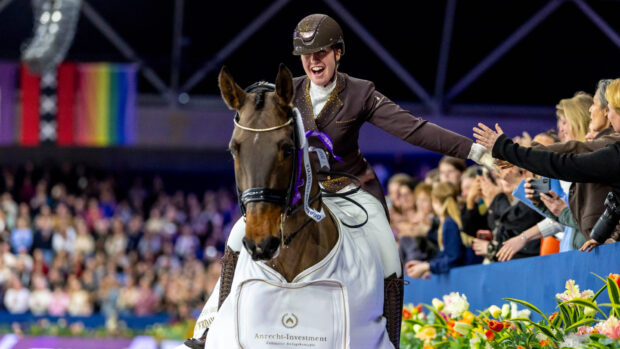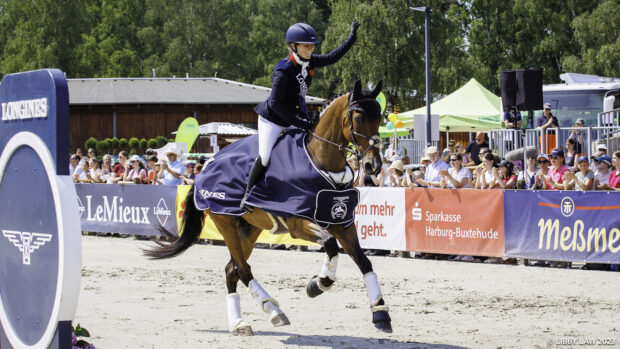Mandatory qualifications to own horses could be one key to welfare and maintaining public acceptance – but all actions should be taken to benefit horses, not for PR.
These were suggestions made at a briefing on the results of World Horse Welfare’s fourth annual survey of the public’s attitudes to involvement of horses in sport, on 3 June.
This year’s study covered perception of sport horses’ quality of life, which many people think could be better.
“At last year’s event, we noted significant initiatives by equestrian sport and racing, and looked forward to the Olympics and Paralympics to provide even greater visibility for equestrianism, and that it did,” said World Horse Welfare CEO Roly Owers as he opened the briefing.
“Every single member of Team GB and Paralympics GB brought home a medal, Japan won their first eventing medal, all in the stunning setting of Versailles. But training practices were also sharply brought into the spotlight. The results last year showed that what riders and those involved with horses say and do has a significant influence on public opinion. What we in the horse world see as normal can sometimes be totally unacceptable to the public.
“So to maintain public acceptance, we must step outside our horse-world bubble to see what the public sees. We also need to be even more transparent and open with the public, which can be daunting and very difficult, but it is essential.”
Mr Owers also cited the charity’s research into what drives trust in equestrianism, which was in mind for this study.
“So what would increase their trust that sport horses really do live good lives?” Mr Owers asked. “The top three answers were allowing unannounced inspections of equestrian training facilities, making equine welfare education mandatory for all those who work with sport horses and publishing the results of welfare assessments.”
These were among the ideas discussed by a panel comprising British Equestrian eventing performance director Dickie Waygood, chair of the FEI vet committee Jenny Hall, vet Brad Hill and David Yelland, former editor of The Sun and PR expert.
Mr Yelland, speaking as “very much an outsider” to the horse world, said he has worked with many organisations that have lost their reputations.
“I don’t see that here,” he said. “I see actually people who care and are doing their best to try to avert problems.”
Changing perception
Mr Yelland cited the Army as just one organisation that has turned public perception from very negative to positive.
“You do that by working very hard, which I think this sport is generally doing, and by not going into denial,” he said. “And I really see you not doing that. Some of the problems I’ve just seen flagged, I don’t think necessarily are problems yet, or ever.
“But someone I’ve worked with longest is Lord Browne, who used to run BP, who was forced to come out in the 1990s. He says homophobia comes back, and you have to win that argument every 10 years with new generations in different parts of the world.
“This is the thing you will have to do; just because you won the argument now doesn’t mean you won’t lose it; you might lose it in five or 10 years. It’s a campaign, but I don’t walk into this room and see a crisis. I see people asking themselves how they would cope if a crisis happened.”
Dickie said it is very positive to see someone outside the industry recognising that we are “on the front foot”.
But he said there should be more education and sharing best practice, and that public perception can mean things are taken out of our hands.
“In Denmark, it went to government level, the use of a double bridle, for example,” he said. “I believe they’ve come up with a really good solution; you have to have a certificate and pass an exam to ride in a double bridle. I think the three million horse owners in this country should have a certificate or a licence and do an exam to own a horse in the first place, which does happen in some countries.”
Dickie said the challenge with this idea, and yard visits, is policing, but that if riders have to pay for the exam and registration, this could fund such a scheme. He added that the biggest influencers, on riders at all levels, are coaches and trainers, and “ educating coaches is one of the biggest ways we can influence, sell the story and subject and improve welfare and wellbeing”.
Dickie also supported mandatory registration and continuing professional development (CPD) for coaches, such as education on updated whip use protocol, and warned that use of language is key; horse sport often uses old-fashioned terms that may not convey the true picture.
Mr Hill added that he believes all owners have affection for their horses, and that no one likes punishing or hitting them.
A different answer
“I think in the moment, they don’t know any other answer to the question,” he said. “They might be presented with a situation and don’t know what to do with the horse, so think, ‘I’m going to give it a smack.’ I think they don’t get satisfaction [from this]; horse people love their horses. I think it’s about showing them an alternative method of training.”
Mr Yelland said the focus should probably be on “pinch points” such as the Grand National or emergence of negative videos, and agreed one suggestion, that coaches should have to undergo CPD to be insured, could be a good idea.
“But if your PR is leading your agenda, it’s never a good thing,” he said. “Don’t do things just for PR reasons; if you ban the whip, for example, that would be wonderful, it might be front page of the Mail, but the next day, there would be a huge focus on ‘What next?’ on areas you don’t necessarily want focused on. Doing things gradually, without announcements, without fuss, which seems to be generally what you are doing, is the best way.”
In closing, Mr Owers said how important it is we all “walk the talk”, improve education and show that this is the case, as the public “has a pretty good understanding of what good welfare looks like”.
“The question for the sector is, how much do we want to self-regulate, and how much do we want to be imposed on by governments?” he said. “And that is not an easy question to answer; we need to walk that line really carefully.
“How are we actually ethically ensuring that the lifetime of the horses we involve in sport is really cared for? I think each of the panelists has come up with a gem today, but possibly the best came from David; that the best PR in the world is to do the right thing.”
- To stay up to date with all the breaking news from major shows throughout 2025, subscribe to the Horse & Hound website
You may also be interested in:

What the public thinks of whips and spurs – and whether sport horses have good lives

Gymnastics turned its sporting ‘crisis’ into welfare reform – can horse sport follow suit?

What the public really thinks and how horse sport can gain trust

Subscribe to Horse & Hound magazine today – and enjoy unlimited website access all year round




